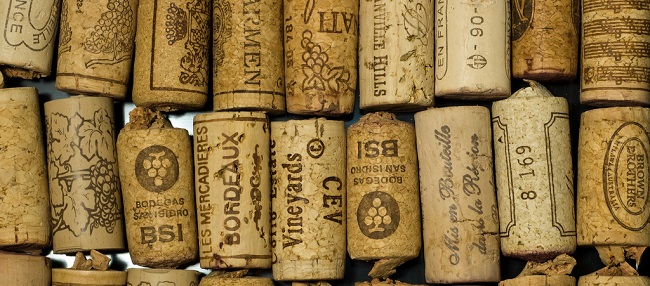
Credit: dawgbyte77
It could be mold.
That’s the risk you run into when you use the bark of a tree to stop up bottles!
A little cork history…
The stopper, commonly called a cork, is made from the bark of a Cork Oak. What’s amazing is that the cork bark is harvested from the tree without causing permanent damage, which means a single tree is capable of producing a lot of cork in its lifetime.
One of the main benefits of cork is that compresses easily, which makes it ideal for stopping bottles. It’s been used as a stopper of wine and other beverages for centuries.
As you can imagine from any wood product, it’s also subject to moisture. More moisture means it’ll expand, less moisture means it’ll shrink. This is one of the reasons why they recommend storing wine bottles on their side, so the wine keeps the cork from drying out.
But isn’t alcohol a mold-killer?
Alcohol is a mold killer but cork is porous, so mold can get inside where the alcohol can’t get to it.
Also, and this might be related, there’s a whole mystery surrounding “whisky black,” a black fungus that grows around distilleries. It has appeared in Scotland, Kentucky, and Canada.
What can you do about it?
Don’t drink it. Mold is serious stuff.
While this has never happened to me with scotch but it has happened with other corked bottles and I never knew you could contact the manufacturer to get it replaced.
Here’s what reader Wayne had to say in our Facebook group:
It’s no biggie – taste the scotch for “cork taint”. If it has a mildew kind of odor, the cork was moldy & you should return it or write to the company. That happened to me with a bottle of Balvenie once (yes, Balvenie) and after writing to them, they sent me a new bottle @ no charge!
In a case like this, it’s all about being unlucky. It’s not Balvenie’s fault, they likely sanitized the corks as they would any other in the manufacturing process and just missed something.
Or a spore landed on it after the fact… who knows. Either way, you can get the bottle replaced, which is nice!

I appreciate this article…I’ve had so many bottles of moldy bourbon from Beam and Buffalo Trace recently it’s made me not want to risk any more money on it…unfortunately, there’s another way mold can get in a bottle– from the barrel/cask. Of the 6 moldy bottles I’ve opened recently, only one had a musty smelling cork..several that didn’t have a musty cork seemed fine at first even, but I got sick after drinking a glass, and upon closer examination (adding lots of water helps here) I found the taste to be slightly off– unless its really bad, it’s difficult to pick it out since it marries with the bourbon…if I wasn’t very alergic to many kinds of molds I might have never noticed it, it’s presence was hardly detectable on the nose or palate– and I can tell where my mom got her lemons from when she makes lemon cake (whether or not she bought organic). I live in Oregon, which has state regulated liquor laws…I wonder if they’d ship replacements to the liquor store for me…at the same time, I’m so put off by the alarming frequency of finding moldy bourbon, I don’t even want to buy more. Scotland has the problem under much, much better control, I’ve never got (mold) sick on any Scotch, ever…though I recall researching Cragganmore 29 CS because I wanted a bottle, until I learned it was no longer available due to “mold issues”. My supplier is very consistent and responsible, so i don’t think it’s the vendor…I feel that Kentucky has a problem and hardly anyone has noticed it (so I guess it’s not a problem for them– but it is for me because I’m alergic to it and get extremely nauseous when I get a bad one). I’ve recently encountered one bad bottle of Booker’s out of two, 2 out of 3 Stagg Jr’s, 3 out of 4 Old Grand-dad 114s…holding my breath that my Stagg Sr will be ok…and the 4 other bottles I’ve yet to open.
I to have had several bottles of Beam that tasted not just a little off but just plain moldy. Tonight I opened a bottle Evan Williams with the same distinct taste. I find it very hard to believe nobody knows this before it’s bottled.